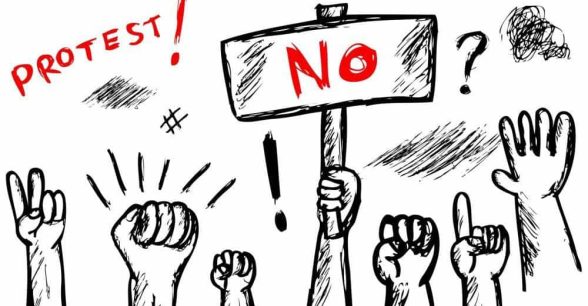People with Physical Disabilities May Also Need Mental Health Supports, and That’s Okay
This is a story that I was almost afraid to tell. But the fact that I hesitated, that I worried about how it may be received by people that know me in “real life,” is the only reason that I thought that it was an experience that needed sharing.
Those of us with disabilities are far too used to labels. Doctors and medical professionals stamp one on our foreheads when a diagnosis is first placed on our charts. Cerebral Palsy. Autism. Hearing Impairment. Educators attach labels, too. Dyslexia. ADHD. Language Processing Disorder. These labels follow us through our lives, and they can dictate the supports we receive, and sometimes, the supports we don’t receive— even if we may need them.
The big label on my own file reads: “Spinal Muscular Atrophy.” It’s written in bold stenciled letters— the kind of font you see splashed across large shipping crates. And, yes, my life must also fit neatly into that crate, too.
My neuromuscular condition has been the defining label of my life. It’s the thing my doctors focus upon. The thing my family most fretted about. The thing I’m most judged upon. To the outside world, it is one damn big shipping crate. But, strangely, to me, my box is way smaller on the inside than it is on the outside.
For years and years, all the focus was placed on my physical condition. My childhood was a swirl of physical and respiratory therapy. Appointments with orthopedic specialists. Pulmonologists. Well-meaning medical professionals measuring and assessing ways to keep me healthy.
Through all of this, however, not once was I offered mental health services. Not once was the emotional toll of my experiences addressed or acknowledged. In fact, it wasn’t until adulthood that I began to understand the gnawing feeling that I frequently experienced was actually anxiety. That there was a name for the overwhelming and crushing sensation that came over me when I was physically vulnerable or I felt unheard. The feelings that I had experienced for as long as I could remember— even longer than I had loved The New Kids on the Block.
But my box had already been clearly labeled. A person with my disability needed V, W and X. Not Y and Z. Since these medical and educational professionals “knew best,” and their system of care was meant to shelter, protect and contain, why the hell would I have anything to fret about? Why would I need emotional support? In their view, I was already supported the way I should have been supported.
This mindset is very pervasive in the medical and educational communities. It can interfere with mental health access for many people, including those that are able-bodied. But, for those of us with existing disabilities, especially those conditions seen as being “unrelated” to mental health, receiving these supports, or even seeking them, can be especially difficult. Society doesn’t value disabled lives in the same way as nondisabled ones. So, as a result, there is a lack of understanding of our daily lives and challenges.
It’s only been in recent years that I have begun to examine the impact this has had on my life. And how very deeply this has weighed upon me. I have thought about seeking counseling or therapy for a long time, but like many of us with complex disabilities, there’s a lot to consider. It’s not just as simple as booking an appointment with a psychologist or therapist. There’s a lot more we must work out first. For example:
“Who will drive me to my appointment?”
“Will I have enough paid hours this month with my personal attendants to have them drive me to counseling, along with all my other appointments and errands?”
“Insurance probably won’t cover these visits. How am I going to pay for this?”
“If I have to choose between having enough money to pay my personal attendants this month or paying for counseling fees, I have to choose my attendants. Who else will help me get out of bed in the morning?”
These thoughts and feelings are commonplace, and these logistical barriers are very, very real. If we can somehow work out these details, there’s still one more thought that interferes in seeking mental health support. A thought— a reality— that is perhaps the most sinister and upsetting of all:
“Many of those around me, already see me as living a sheltered and dependent life. If I seek counseling, it only feeds the notion that I’m delicate and incapable. I don’t know if I have the energy to push through that ableist stereotype again— and again.”
This last thought, while emotionally damaging, is still very much a part of my reality. Of the disabled reality. And we combat this day after day.
Recently, I took the step, dealt with the logistical hurdles, and found a therapist willing to do online sessions. While still difficult to fit into my schedule and tight budget, I found a way to make it work. This decision felt empowering— and long overdue.
But, while the logistical barriers seemed manageable, it ended up being the last, more visceral fear that came true more quickly. This reminder became the starkest slap of reality in this otherwise positive process.
My weekly appointment slot for counseling is directly after I have a scheduled shift with a personal attendant. It’s the only scheduled time that worked for me and the counselor. Recently, I had one of my backup personal attendants scheduled for a few shifts because my regular attendants were unavailable. So, on the day of my counseling session, I needed to make sure we were done with my routine on-time, so I could make the appointment. I let the backup attendant know this soon after she arrived that day so we could plan our time accordingly. But it was her instinctual reaction to my simple and benign statement that was a bucket of cold water into my face:
“Wait— what do you need to see a counselor for? Are you paying this person? Why don’t you just talk to the people who know you? They are the ones that can give you all the advice you need.”
Then, she began to question me further, to doubt me, and to judge me— all while I was literally naked in the bathtub with her standing above me. Then, she scoffed and added:
“You’re better than this.”
My vision tunneled, my ears began to hollow and I was suddenly that little girl again, being pummeled by society’s views of people like me. Corralled by the label on my crate. And pushed to remain inside the box in which I belonged.
Intellectually, I knew that her vehement response probably had nothing to do with me. That all of us carry notions, experiences and judgments that color our responses and behaviors. Perhaps she had an event in her own personal life that negatively colored her view of therapy. Nevertheless, the fact that the underlying meaning of her words so closely aligned with own my fears—and that they came from the mouth of someone I was relying on for life-sustaining care—was upsetting. It was a reminder of my vulnerability, and the vulnerability of all of us that rely on personal attendants or family members for our survival.
I had to swallow my upset as much as possible because I had to rely on this backup attendant for the next few shifts. So, I needed to diffuse the situation very quickly— all while needing help getting clothes on my naked ass. I tried desperately to calm my racing heart and push aside my raw feelings of helplessness so that I could get through the immediate situation.
A little later, she apologized and said I shouldn’t pay attention to her ramblings because they didn’t matter. In truth, she does mean well, and does care. And I think she could tell that I was upset by her unwarranted attack.
But, really, it did matter. Being confronted by attitudes such as this is what keeps many people from seeking emotional support. It keeps people like me from sharing their voices.
Many of these well-meaning people, like this backup attendant and like the paternalistic medical professionals and educators, really do care about us. They honestly do. Frankly, we care about them, too, and we are grateful for the support they are able to offer. But that’s what makes this situation so complicated. The power dynamic is skewed against us. And it’s why those of us with disabilities have difficulty getting the support, especially the emotional support, we need.
Despite all the genuine caring, it’s difficult for most to fully understand the disabled experience. To appreciate the unique challenges we face and must balance. But, unless society evolves its view of disability, these damaging and ableist stereotypes will persist. And these notions will continue to be absorbed into the culture of future generations— slapping us when we are at our weakest…our most naked.
I debated about even sharing the story of my experience here. That somehow this could be read, misconstrued, and used against me. But the fact that I am worried about that simply shows the importance of why this story needs to be told.
Yet, this situation isn’t unusual. Some would even call my experience mild. After all, things like this happen to disabled people every day— some instances are small, like this. Some, though, are far more extreme, and sometimes even dangerous.
But we still must raise our voices whenever possible. It’s the only way society will ever change. That said, it’s really not easy to do this. And I fully understand why so many feel forced to stay silent. I have been there. I have done that in other situations in my life— far too often. And it makes me sad to admit that here.
Taking all this into account, when you think about it, it’s still really surprising that there are those that wonder why we need counseling in the first place? You’d think that all of this would be proof enough. But, apparently not.
About Rooted In Rights
Rooted in Rights exists to amplify the perspectives of the disability community. Blog posts and storyteller videos that we publish and content we re-share on social media do not necessarily reflect the opinions or values of Rooted in Rights nor indicate an endorsement of a program or service by Rooted in Rights. We respect and aim to reflect the diversity of opinions and experiences of the disability community. Rooted in Rights seeks to highlight discussions, not direct them. Learn more about Rooted In Rights



